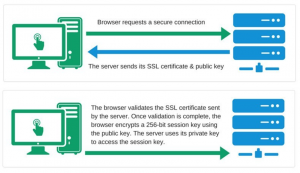Essential Cybersecurity Tips for E-commerce Security
The e-commerce industry has been growing exponentially, which has led to several wannabes willing to mirror the success of their peers. Studies show that global e-commerce revenues are bound to increase to US$ 5.4 trillion by 2022. Most of these websites require users to enter their personal information. Some websites even store financial details too.
The advancement of technology has helped cyber criminals too. They are also using advanced techniques to break into businesses’ networks. The increase in the number of data breaches has led companies to spruce up their defenses, with the global cybersecurity market expected to reach US$ 352.25 billion by 2026. The article will discuss a few tips for e-commerce security.
Choose the ideal platform for the business.
One of the first steps to ensure security is by selecting the ideal platform for your online shop. You will be unable to switch the platform at your will. Hence you must be judicious in your decision. Apart from being easy to use, data security must be an essential factor too. It starts with building the future roadmap and the features needed for your platform.
You must set a budget and then search for solutions to address the features you wish to have in your e-commerce platform. Assess the pros and cons of each option, while you must also choose whether you want to go for a self-hosted or a cloud option. The other factors like costs to maintain and update the platform must be considered too. The ability to customize on the fly is critical too.
Being on HTTPS is mandatory.
One of the critical issues that businesses face is customer trust. With an increase in data breach incidents, customers are apprehensive about the entities with whom they do business. Therefore, they always look for the padlock sign on the address bar that enthuses trust about e-commerce security. As an added security measure, e-commerce businesses must choose a SSL certificate. Let’s delve into this a little more. Ecommerce businesses generally seek to expand their primary domain into multiple subdomains. For this reason, they prefer buying and installing a wildcard SSL certificate as it renders security to their main domain and unlimited first-level subdomains under it.

As businesses that undertake online transactions must adhere to the PCI-DSS norms, you must procure an SSL certificate. The PCI-DSS standards require you to follow a specific set of rules if you wish to have credit card transactions on your online store. It aids in cybersecurity that can be achieved through collaboration between the various departments of the business.
Use a robust antivirus and a firewall.
To ensure the security of your online store, you must install a utility firewall that would also come with a firewall alongside. The antivirus must be updated with the latest virus and malware programs. Moreover, sophisticated ones can track any malicious activities occurring on the platform. Some can also allocate a fraud risk score that can allow businesses to determine whether a transaction was genuine.
The firewall can prevent cybercriminals from accessing the underlying networks of your business. The traffic on your website is regulated and ensures that only authentic visitors land on your website. They are needed to beef up the cybersecurity defences and prevent cross-site scripting and SQL injections.
Run system audits often.
What is the best way to know any suspicious activity on your systems? Yes, by undertaking a system audit. Do inform your IT team to undertake a full system audit periodically. There must be adequate control points that can help to ascertain whether there was any malicious activity on your networks and the website. The servers and security panels must be secured, and it is also essential to ensure payment gateway security.
You can also deploy security plugins that can protect the site against malicious attacks by cybercriminals. Most of them use newer methods like code injections, bad bots, XSS, etc. Apart from undertaking regular checks, the security plugins can keep your site secure in the interim period. The security audits can also help to ensure performance, service fulfilment, navigability, etc., about the site.
Ensure proper backups
You must keep an updated backup of your customer data. Data is critical for the industry, and there are occasions when the data may be corrupted due to various factors. Therefore, you must ensure periodic backups of the data as well as the website. It will help to be back into action faster in case of any untoward incident.
You must also choose the ideal backup service for your website. You may take the help of a cloud backup service provider, but check the security protocols in place. Ensure that they provide an end-to-end encryption mechanism to keep your data secure.
Stay updated with security patches.
If you are using a content management system, you must keep it updated. It will ensure ecommerce safety as it will plug the vulnerabilities, if any, in earlier versions. Hackers can exploit outdated software to launch an attack on your business. You must also ensure that the plugins used for your site are updated too.
It is also essential that the individual devices used by your employees are updated periodically. You can set notifications to inform the relevant teams whenever such patches are available. These patches must be installed on all the terminals used by your employees.
Conclusion
As a business owner, you must stay aware of the cybersecurity challenges and have proper processes to thwart them. There have been incidents at different companies covering various verticals. Any critical attack can wreak havoc on your business.
You must install SSL certificate as an effective practice to ensure e-commerce security for your site. In addition, we have listed out other tips that can help to prevent any cyberattack.













